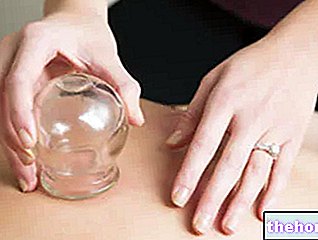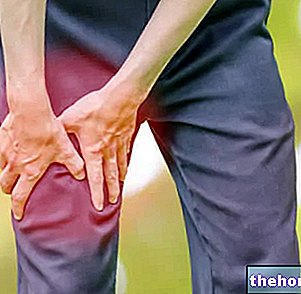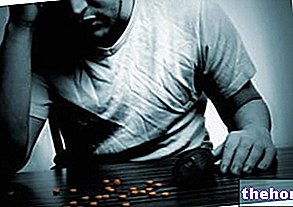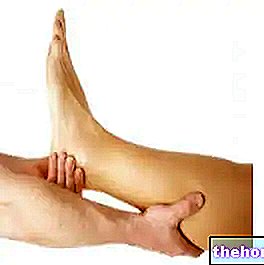Insomnia
Insomnia represents one of the most complex problems with a subjective perception: in fact, if a person perceives a certain state of insomnia, the same condition can be felt as absolutely normal by a different subject.
Before analyzing in depth what can be the causes of insomnia, it is necessary to define the opposite phenomenon: sleep.
The sleep
Sleep is defined as that natural and biological phenomenon that alternates with wakefulness: the brain processes all useful information and neglects or represses useless ones.

Causes of insomnia
After having briefly analyzed the complementary phenomenon to insomnia, we now pass to illustrate the possible triggering causes: first of all it must be emphasized that the interpretation of insomnia and emotional disorders in general is subjective, therefore often difficult to study.
A subject can consider himself "rested" after having slept six hours, for example, but for another individual the six hours would not be able to fully satisfy the rest of the same: this depends on how our body has been accustomed, but not only . It has been shown, in fact, that emotional, psychic disorders, fears and anxieties have a very substantial influence on a subject's sleep. Added to this is an incorrect lifestyle: in fact, if a person drinks a lot of coffee, goes to sleep late or eats heavy foods before going to bed, the chances of suffering from insomnia are high.
According to recent data, it is estimated that the Italians suffering from insomnia are between ten and fifteen million.
Types of insomnia
As we have seen, insomnia manifests itself with a marked subjectivity: it is also defined as a multifaceted disorder, since it manifests itself in different ways. In particular, insomnia can be primary or secondary symptom of some pathologies (e.g. depression), secondary expression of sleep disorders (for "sleep disorders" we refer to apnea, narcolepsy, myoclonism (controlled movements of the organism) which induce the typical perception of insomnia: having slept badly) or reflection of socio-environmental conditions (with immediate reference to stress, a condition not well defined in its causes and in the pathological plan).
Not to forget the possible (and very probable) insomnia caused by substances of abuse, in which the only remedy is the pharmacological correction.
In all these different types of insomnia, with the exception of the last case, it is possible to intervene with herbal products, therefore of natural origin, to alleviate and lighten this real disorder.
Insomnia and natural remedies
It is good to remember that stress - which can lead to a state of anxiety, consequently causing insomnia - is often connected to the environment in which we find ourselves: it is therefore precisely what surrounds us that can, in some way, influence the our psychology. In fact, blue, for example, stimulates industriousness, green concentration and relaxation, while red enhances aggression. From this, it can be deduced that sleeping in a room whose walls are painted red certainly does not help the person sleep.
Even the fragrances often interact with the emotional state of the subject: in fact, thanks to its anxiolytic properties, lavender seems to help the body to relax, thus favoring falling asleep. This explains the reason why often in the wardrobes there are perfumers for clothes with the essence of lavender.
To combat insomnia with natural products, there is a wide range of products on the market, in particular we refer to herbal teas and capsules.
Among the typical drugs that help fight insomnia, we remember: chamomile, lemon balm, passion flower and valerian. Less well known are escolzia and griffonia.
Very important is magnesium orotate, that is to say a magnesium salt in which the mineral is complexed with vitamin B13 (orotic acid). This element is fundamental and is used by our body in case of stress; consequently, it can be inferred that in such circumstances the magnesium levels drop sharply. This element is also a cofactor of many enzymes, including those that regulate sleep. The combination of mineral drug (Mg) with natural substance (vitamin B13) gives the product great validity, since by complexing the magnesium with vitamins it makes it more usable by our body.
In addition to the use of natural products, however, the accent must be placed on a very important factor: sleep hygiene, an expression of the quality of sleep itself. Consequently, if sleep hygiene is not performed, most likely will verify insomnia. The bedroom, in fact, must be an environment suitable for sleep; it would be advisable, then, to practice relaxation techniques before going to bed, always going to sleep at the same time; it would also be advisable not to sleep during the day , do not eat before bedtime and do not smoke. Even the use of exciting substances such as coffee, tea, cocoa, guarana and ginseng increases the probability that the body will suffer from insomnia; finally, alcoholic substances should also be avoided: initially they can bring drowsiness but once their effects have ended there is a risk of waking up during sleep.
Beliefs and tradition
“By eating a single almond before going to bed, sleep will come without calling it”: this is how an ancient popular tradition recommends a method aimed at counteracting insomnia, or, better said, at preventing it. The reason behind this recommendation is however not clear, although it can be emphasized that almonds contain a lot of magnesium: as mentioned above, therefore, magnesium is a cofactor of sleep regulating enzymes.
Particular is another theory, which suggests a potential solution to counteract insomnia: it seems that a pillow filled with flowers and hop leaves improves sleep. Considering that even in this case it is a tradition handed down from generation to generation, the scientific explanation is not clear. The only hypothesis that can be considered is that hops have mildly sedative properties: hops, not surprisingly, belong to the Cannabinaceae family, just like cannabis, a drug known since ancient times for its calming properties.
I don't know how to redirect how v "intrai, tant" was full of sleep at that point that the true way I abandoned (Inf. I, 10-12)
Yes ruminating and yes looking at them,
sleep took me; the sleep that often,
indeed that "the fact is, he knows the news.
In the now, I believe, that of the east,
first he reached Mount Citerea,
that always seems ardent with the fire of love
(PURGATORY - SONG TWENTY-SEVENTH vv. 91 et seq.)




























